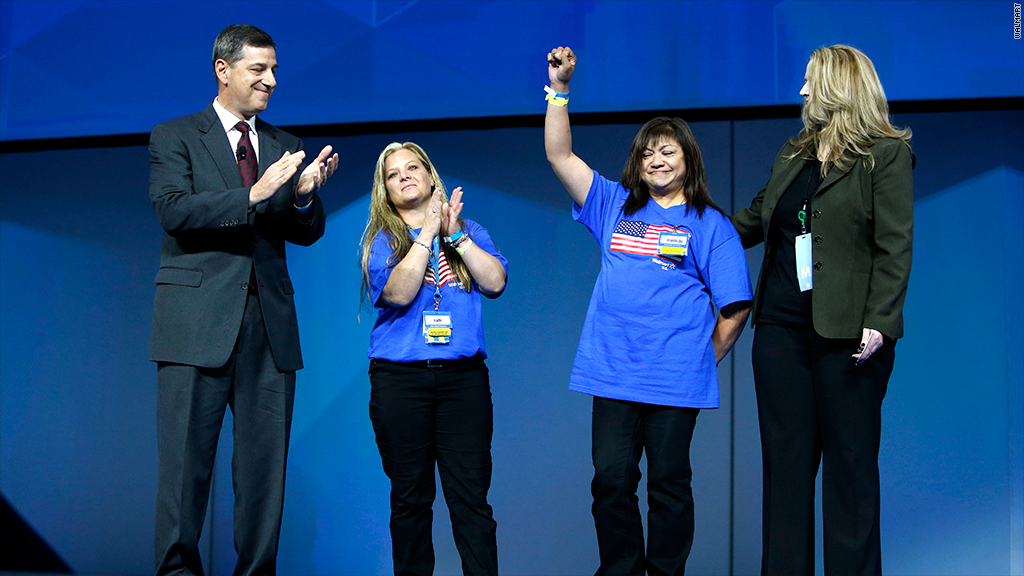
Wal-Mart Stores' executives defended the retailer's treatment of employees, saying they promote 500 workers "every day" -- including two on the spot -- at the company's annual shareholder meeting.
At Friday's meeting in Fayetteville, Ark., Wal-Mart U.S. CEO Bill Simon called two associates -- who both recently applied for assistant manager positions at their stores -- up to the stage and promoted them.
"Because of your hard work, your dedication to your customers, you have both earned these promotions," said Simon to Kari Grissam of Cave Creek, Ariz., and Mary Lou Singleton of Pleasanton, Calif. "Here are your new badges."
"And by the way, this comes with a raise," Simon added. "Now...who's next?"
But despite the typical rah-rah atmosphere at the meeting, with entertainers such as Hugh Jackman and Jennifer Hudson, executives couldn't duck critics of the company's policies.
Janet Sparks, an employee at a Wal-Mart (WMT) store in Louisiana, presented a shareholder proposal requiring senior executives to hold a large portion of their shares until they reach retirement age. She said this would better align the interest of Wal-Mart executives with shareholders.
Related story: U.S. companies drag feet over Bangladesh factory safety
"Most of the $20 billion you received came from bonuses," said Sparks, addressing Wal-Mart CEO Mike Duke. "But at the store where I work, associates have only received two quarterly bonus in the past five years. One was only $26.17."
"The bonuses you and I get are supposed to be tied to the performance of our stores and our company," she added -- but to no avail. The proposal was defeated.
Wal-Mart says it is doing well by its 1.3 million U.S. workers, promoting 160,000 of them a year. It maintains that about 75% of its store managers -- who make up to $170,000 a year -- started as hourly workers.
"We're ensuring all associates know what shifts are open if they want more hours," Simon said, adding that current employees will also be given preference for open positions over external candidates. He also said there are between 15,000 and 50,000 jobs available on any given day, "so it's not hard to get in."
Related story: Wal-Mart's low wages cost taxpayers
On another issue of contention, Bangladesh labor activist Kalpona Akter told attendees that unless retailers such as Wal-Mart push for better working conditions in her country, the situation will not improve. Akter referred to the factory building that collapsed in April, killing more than 1,000 workers.
"What happened should never have happened, and we can never let it happen again," said Akter, adding that Wal-Mart goods were produced at the factory.
Addressing the Walton family that controls Wal-Mart, she said "Fixing these factories costs just a tiny part of your family wealth. If the world's largest retailer refuses to improve the state of workers' rights and labor standards, things will not change."
On behalf of New York City's pension funds, Akter presented a shareholder proposal -- which also failed -- to allow shareholders to call special meetings as needed.
Related story: We met and got married at Wal-Mart
For its part, Wal-Mart has announced that it will tighten its monitoring of factories in Bangladesh. Some U.S. and international companies have also signed on to fund a five-year, legally binding agreement that would improve factory conditions in Bangladesh. Wal-Mart has not participated in that effort.
Also at the meeting, Wal-Mart, whose shares are up 12% this year despite sluggish sales, announced a $15 billion share buyback program that replaces a similar program announced a year ago.

